
Isometric - from the Greek isos, which means "the same", and metron which means "size".

|
|

An assortment of webbing hardware and homemade handles. (see the Miscellaneous page for webbing tips and ideas)
|

|
|
|
|
|
|
|
|
|
|
|
|
|
Isometrics utilizing some leverage
- gruntbrain
 Alexander Zass was a noted strongman from the early 20th century. His claim to fame was his ability to bend thick iron bars and to snap chains with his bare hands. What makes Zass so unique was not only his ability to perform these astounding feats of strength, but the way in which he developed the strength to be able to do these things.
Alexander Zass was a noted strongman from the early 20th century. His claim to fame was his ability to bend thick iron bars and to snap chains with his bare hands. What makes Zass so unique was not only his ability to perform these astounding feats of strength, but the way in which he developed the strength to be able to do these things.
As a Russian prisoner of war held in Austrian prison camps during World War I, he developed a powerful physique and tremendous strength by pulling on his prison bars and chains. He had been a strong man prior to the war, having worked out religiously as a young man, but as a prisoner, he discovered the means by which extraordinary strength could be achieved. At one point, Zass found himself shackled in solitary confinement. He was concerned that, being unable to exercise properly, he would deteriorate and loose the strength and physique he had spent so many years developing. It was then that he began pulling on his chains and prison bars as a means of exercise. To his great delight, he discovered that this type of training actually increased his strength. Finally, when the time was right, he bent the bars to his prison window, snapped the chains of his manacles, bent one of the bars clear around to be used as a j-hook for scaling a wall, and made good his escape! After the war, he went on the road as a strongman and gained fame throughout Europe and England as "The Amazing Samson" . He also sold a course of strength-building utilizing the methods he had developed as a prisoner of war, and which he, himself, practiced throughout his illustrious career.
With the advent of the Internet and a growing interest in the early Iron Men, Alexander Zass has been resurrected from virtual obscurity and is today being hailed by many as the Father of Isometrics. Our modern day familiarity with Alexander Zass, as well as with many of the Iron Men of the Golden Era, is due to the efforts of two men, Roger Fillary and Gil Waldron. These two men, along with contributions made by Gordon Anderson, have worked tirelessly and continue to do so to chronicle the photos, lives, and workout programs of the pioneers of physical culture on their site, Sandow . This is the definitive site on the subject, and both Roger Fillary and Gil Waldron deserve enormous credit and thanks for their important contribution to posterity. You can go to this site to find Alexander Zass's fascinating autobiography. Not only did he live an extraordinary and exciting life, but his well written autobiagraphy also lends insite into European and British culture at the turn of the twentieth century.
Through a lot of research and digging, photos of Alexander Zass demonstrating his exerciser have surfaced, but the actual course of exercise that he sold has yet to be found. Among practitioners of Isometrics, the Alexander Zass course is the "Holy Grail" of workout programs, and a worldwide hunt ensues in hopes of finding it.
And now, tao has made his own Alexander Zass exerciser and has developed his own program of exercise.



- Contributed by tao
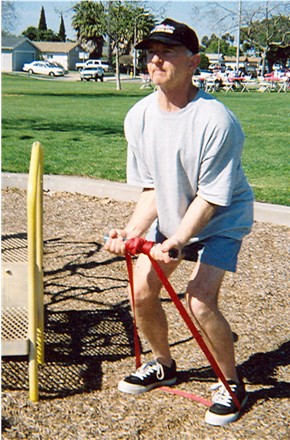
Here's an Isometric device that will enable you to move as quickly as possible from exercise to exercise. All you've got to do is roll a pipe to the desired position. The magic ingredients here are webbing and athletic tape. A couple of rolls around the tape, and the webbing binds and will not slip!
The quickness with which you can adjust the height of the bar enables you to easily perform the same exercise from three different positions, like curls for example, ensuring overall development of the biceps.
Here's how to create this exerciser:
|
Attach the webbing to a an athletic-taped pipe via a slip knot. The pipe shown here is a 12" length of 1" PVC inserted into a 1 1/2" rubber utility hose for a wide, supple grip.
|
Here are some examples of exercises that can be performed with the Roller Iso-cizer:
|
|
|
Isotonic/Bodyweight exercises can also be performed using this device, as shown on the right.
Lean back and use it as a wrist roller!
Now, you might not have a playground across the street. Here's an easy to make door attachment. Slip a length of 1" webbing, or rope through a short length of PVC whose ends have been sanded and rounded, tie a tight square knot and push the knot into the pipe. You can add a carbinger, as shown, or an s-hook with which to attach your Roller Iso-sizer. Slip the attachment under or over a door, and shut the door. You could make two of 'em - one for atop a door, and one for underneath.
|
|
The ability to quickly adjust to any length also enables you to perform isometrics from different positions. For example, you could perform curls or shoulder presses from low, middle, and high positions.

Contributed by BodybyAtlas

Here's my idea for an isometric machine. Basically it's comprised of two 7 foot 4 x 4's with 1" holes drilled 4" on center for 1" wooden dowels. The 4 x 4's are jointed at the bottom and secured to the base structure with (2) 3/8" bolts ea. side, and 2 x 4 bracing, back and front. Using a 5' steel bar or pipe, you could slip the dowels into select holes on either side and perform a myriad of barbell type isometrics ranging from dead lifts through squats and up to presses. The lower holes could be used for pushups, and the top holes, which are drilled angled slightly downwards could be used for chinups.
Making a longer platform, say 4' x 4', or even 4' x 6', would make this machine more versatile. You would be able to attach heavybags, resistance bands, Jungle Gyms, Power Rings, webbing exercisers, wrist rollers, etc.
Shown here are some Isometric exercises being performed on a machine of similar design:

- Shenandoah

The Iso Strap essentially works the same way as the Isometric Stand above. You stand on the strap and grab hold of two handles on either side. The Iso Strap consists of a long length of 1 1/2" webbing with a fixed handle on one end, and multiple holes in which to slip another handle with a fixed hook. An over door/underdoor attachment greatly increases the number of exercises that can be performed. With the door attachment secured at the top of a closed door, you can perform push down/pull down exercises. The door attachment positioned at the bottom of the door makes the strap ideal for triceps curls. You can lower or raise the heights of the handles by simply stepping away or closer to the door.
You add as many holes as you want to, whenever you want to, wherever you want to, allowing as many isometric exercises that you can conceive of. You can do everything from iso squats, through iso bench presses (with the strap against your back), on up to iso military presses. The quick adjustment also enables you to perform the same exercise from various positions - curls, for example. You could have your Iso Strap set up to do curls from the bottom, middle, and top of the exercise, resulting in full development of the biceps. You can do concentration curls by sitting down and holding the fixed handle in one hand with your elbow braced against the inside of your knee, while holding the strap down with the foot of your other leg. This would allow you to perform concentration curls from three different positions super-fast.
The Iso Strap will also enable you to perform Alexander Zass type isos as seen above.
Here's how to make it:
Determine the length of 1 1/2" webbing you need by standing on a length of webbing and raising your hands straight up overhead, holding the webbing in each hand, and then measure and cut that length of webbing. Add a bit more than you feel you need to assure that it is long enough. You can always cut off the excess. In my case, at a height of 5'9", I cut a length sixteen feet long and ended up needing fourteen feet. Singe the cut ends with a flame to seal them and to prevent them from unraveling. Do this with every length of webbing that you cut.
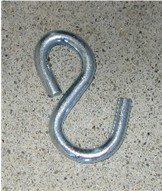
I went looking for a couple of eye hooks of the type found at Lowy Enterprises. Of course, there isn't a hardware store in the entire free world that carries this item which millions of people would have practical uses for, so I got a couple of S hooks from Ace Hardware and they allowed me to use their vice to smoosh one end of the S hooks into an eye.
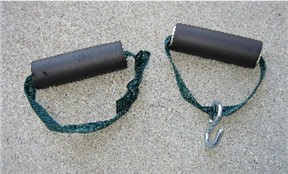 I made two 5" handles from 3/4" PVC with rubber pipe insulation. Sand and smooth the edges of the PVC. Cut two lengths of 1" webbing 24" long, slip one of the hooks over one of the lengths of webbing, slip the webbing through the handles, tie a good, tight square knot on each, and then tuck the square knots into the handles. There is no need for the webbing to be of equal length when tied. If I had been making a devise that required the webbing to be of equal length, then I would have sewn the webbing. But why create work for yourself when you don't have to?
I made two 5" handles from 3/4" PVC with rubber pipe insulation. Sand and smooth the edges of the PVC. Cut two lengths of 1" webbing 24" long, slip one of the hooks over one of the lengths of webbing, slip the webbing through the handles, tie a good, tight square knot on each, and then tuck the square knots into the handles. There is no need for the webbing to be of equal length when tied. If I had been making a devise that required the webbing to be of equal length, then I would have sewn the webbing. But why create work for yourself when you don't have to?
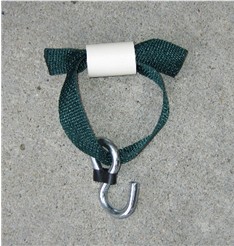
Using a short length of PVC and a 12" length of 1" webbing, make a door attachment in the same manner that the handles were made. You'll notice a narrow piece of vinyl tape wrapped around the hook. That's there to close up the gap that you'll see in the picture of the S hook above, to prevent the hook from slipping off of the webbing. If I had been using rope instead of webbing, this wouldn't be a concern. The tape works just fine, but at some point I might close that gap with some JB Weld just to have a finished product.
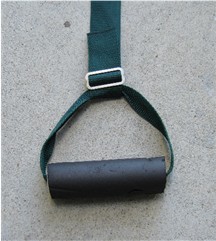
Secure the fixed handle to one end of the strap using a slider.
Here's how you determine where to put the holes in the strap:
Stand on the strap and, with one hand, lift the fixed handle to the position you want your hands to be in for a particular iso exercise. Take hold of the other side of the strap with your other hand and bring both hands together in front of you, pulling the strap taut. Place the thumb of your hand holding the strap to where the fixed handle is attached to the strap on the other side. From where your thumb is located, measure down 3" and make a mark with a marking pen. The subtraction of 3" takes into account the length of the hook on the detachable handle.

I punched holes into the webbing using the largest punch attachment from an inexpensive leather punch kit I got at Micheal's.
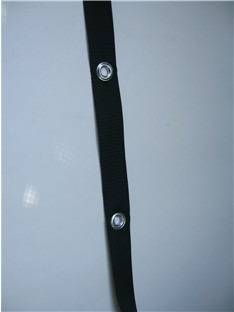
Secure the holes with eyelets. Eyelet kits can be found at either fabric stores or hardware stores, or from the webbing links shown on our Resources page.
As well as an Isometrics Exerciser, the Iso Strap, together with the door attachment, also makes a world-class Bodyweight Exerciser! See the Bodyweight page for ideas, in particular, the 15 Minute Door Gym.
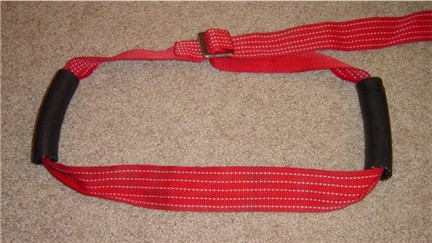
Here’s a unique adjustable strap utilizing a slider with rounded edges that will allow you to adjust any nylon or neoprene strap with ease during your workouts. As you adjust the strap to desired lengths, you can mark the settings at the slider with a marking pen.
|
Step 2: Take the other end of the belt strap and loop it through the same way as shown in Step 1. |
|
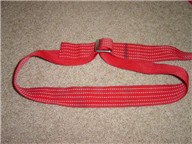
Voila'! You're good to go. Use your iso strap as is or add 1" utility hoses for handles as shown above. |
Pics contributed by Bob Pone
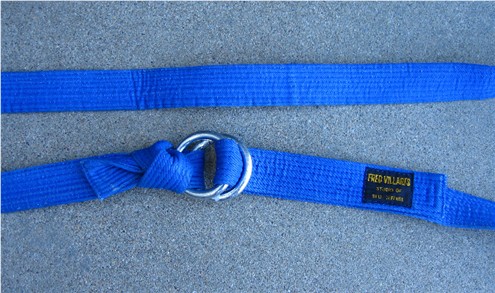
And making quick adjustments is a "cinch" with this iso strap! A cinch is the same mechanism used to tighten the saddle around a horse. You can use either D rings or O rings as seen here. Simply slip the end of webbing over and through as shown, and that's it. Once tightened, it will not budge, and then to loosen it, simply loosen it. It's that easy. Note also, that the belt has been tied around the rings. A slider could have been used, or the belt could have been sewn, but why create more expense or work when you don't have to? And note also that an old martial arts belt makes a great, heavy duty strap.
As with the Easy Slide Iso Strap shown above, you can use any length of webbing you choose for all your iso or bodyweight needs.
Looking at the top of this page, you'll see a picture showing the cinch set up utilizing a carbinger which can be hooked onto something, greatly increasing your range of exercises.
When it comes to creating your own equipment, virtually anything you can think of is possible.
Here is an iso exerciser that enables you to pull with palms inward, outward, upward or downward. Think hammer curls or triceps curls. The top handle is a PVC pipe and the side handles are rubber pipe insulation wrapped with electrician's tape. |
This exerciser gives you a choice of using a length of PVC or some rubber utility hose as a handle. Note that a plastic slider can be used for most your needs, although a metal slider insures maximum strength. |
For this easily made device, a rope is slipped through a couple of foam bicycle handles and then tied on the ends. Bicycle handles provide numerous options, from simple foam, or for the ultimate in decadence, molded rubber. The exerciser shown above also demonstrates how easily you can make dedicated isosizers. Make a bunch of 'em for various exercises! You can also combine a few of them by looping them together for readily available differing lengths. |
Yet another quick method of attaching a handle to a rope - just slip the ends of a rope through the handle and tie knots on either end. |
Here's a "grip assist" exerciser. Slip your fingers between the handle and the webbing, and the webbing will keep your hand held fast against the handle. One knot is all that's needed here. Just slip the ends of webbing through a handle and then slip one of those ends around and through again. |

This is a fantastic setup which enables you to move quickly from one isometric exercise to another by simply gripping and releasing the handles.
I slipped the ends of two tight-woven, polyester, 3/8" thick, fifteen foot ropes through either end of two foam rubber bicycle grips (If you're taller than I am, 5'9", you might want to use longer ropes). Pull the ends of the ropes through the handles to create loops, as seen above, being careful to keep the extended ends of the ropes equal in length. From there, you simply stand on the loops and lift the handles to a desired position. At that position, just grip the handles and perform an isometric exercise. You don't have to grip very hard to hold the rope fast. I'd imagine that doing this over an extended period of time will contribute to some pretty hefty forearm development.
The beauty of this exerciser is being able to move quickly from one exercise to another. You can easily perform isos from various positions of the same exercise, i.e., curls - low, middle, and high. With the handles at a specific height, you can perform various exercises that utilize the same height, i.e., curls, triceps extensions, lateral raises.
Obviously, the progression on this exercizer is continuously upward, so, for a full isometric workout, you'd want to start low and work your way up. You could begin with squats, then deadlifts, and then up to back rows, and on to curls and extensions, and end with triceps curls and presses, and anything in between you can think of. Remember, too, that each of the exercises can be performed from multiple positions.

I decided to make a foot stand, as I'd rather have the loops to my sides rather than under my feet, especially for squats. I made this stand from 1 1/2" webbing and a couple of D rings. I could have just as easily used a rope to connect the two loops, but I have lots of webbing and related hardware, and I like the idea of a finished, professional looking product.
|
|
|
|
|


Even More Better......I discovered through use that the ropes have a tendency to occasonally bind within the handles. So, I just eliminated the handles all together and replaced the ropes with 5/8" thick rope, providing a nice, thick, substantial grip. I simply cross the ropes in my hands, lift, and grip at my various iso stations. Works great, and surprisingly little grip effort is needed to hold the ropes in place. What could be simpler than that!
- Shenandoah

This nifty, handy little device provides real isokinetic resistance! Don't laugh! This Four Paws Rough and Rugged Ring which can be found in any well-stocked pet store makes a perfect exerciser! It is a 7" ring of natural gum rubber which provides just the right amount of elasticity for maximum isotonic exercise....and it floats!
A Kinder, Gentler Doggy Ring: Tape pipe insulation to the dog ring that is mentioned in the Homemade Equipment site. With 2 rings combined with webbing the exercises in www.ringtraining.com can be done comfortably; the rings tend to pinch hands so the insulation minimizes the pinching.
Here's an effective workout device utilizing the doggie rings in conjunction with webbing and other such sundry items as found on the Useful Info page:
|
|
|
|
|
|

Here's another outstanding isokinetic exerciser - an extra rubber reinforced mountain bike inner tube! With this device you could perform a plethora of exercises; hack squats, curls, the archer, stand on it and hold it behind your back with both hands and perform a bent over triceps extensions, back rows, loop it over a doorway and do triceps push-downs and other pull down exercises, hold it behind your back with one hand and grab the other end high up with the other hand and then spread spread your arms apart hitting the triceps from both directions, fold it up a few times and then wring it like a towel.
Hook it around a door knob and do a one arm press or triceps curl, or various pulling exercises.
Fold the Mega Ring over once for stronger resistance or for exercises requiring a shorter expanse.
The possibilities are virtually endless! Just great!
Here are a few ideas:
|
|
|


This particular solid-core tire will give you super resistance. Less elastic than the inner tube pictured above it, the Super Mega Ring is strong enough to hang from. Secure some wrist/ankle weights. Swing the Mega Ring much like you'd swing a Club or Tornado ball. Standing ab crunches can be perofrmed by looping the ring over a chinup bar. A person could come up with scores of exercise related uses for this monster!
It can be found at www.nomreflats.com
For this exerciser, tape together a bunch of elastic resistance cables or surgical tubing as shown. From there, simply grab a handful for any amount of resistance you want. You could wrap it around a chinup bar for pull-down exercises. No chinup bar? Tie a length of webbing around the center and create a big knot. Place the webbing over a door and then shut the door tightly.
|
|

See the Grippage page for instructions.
visit